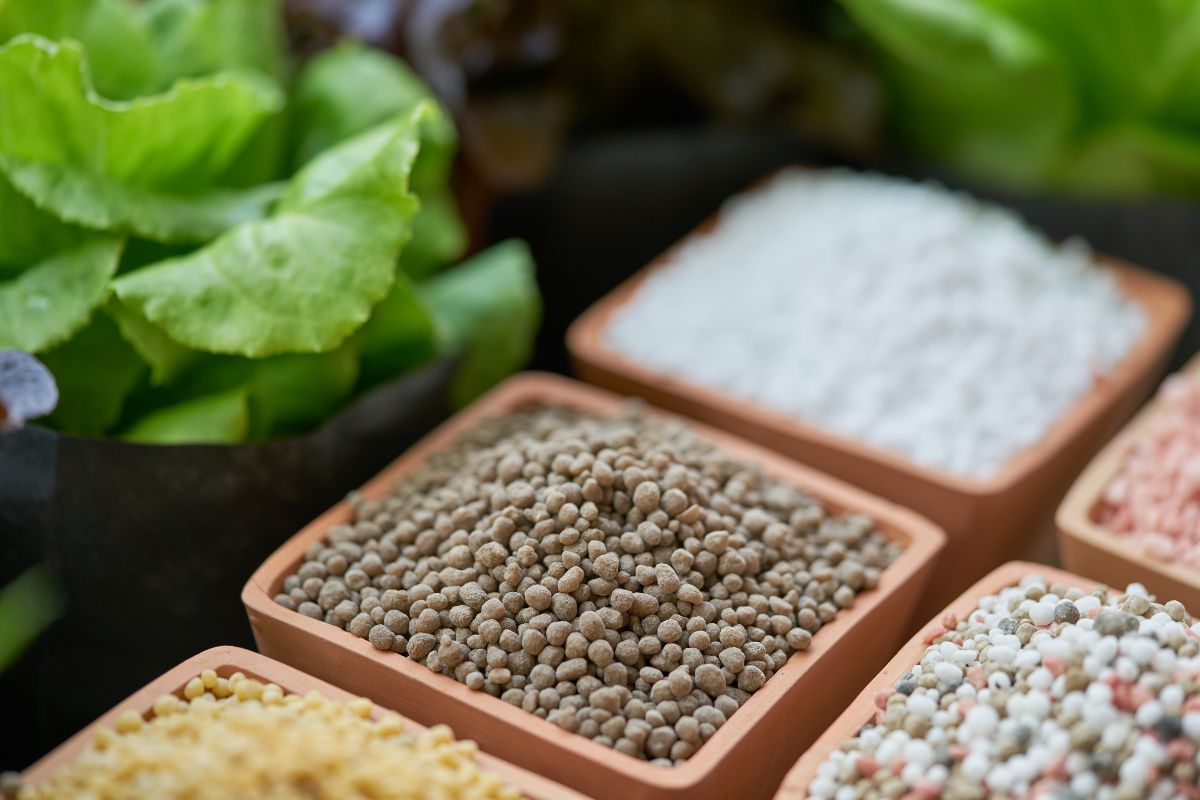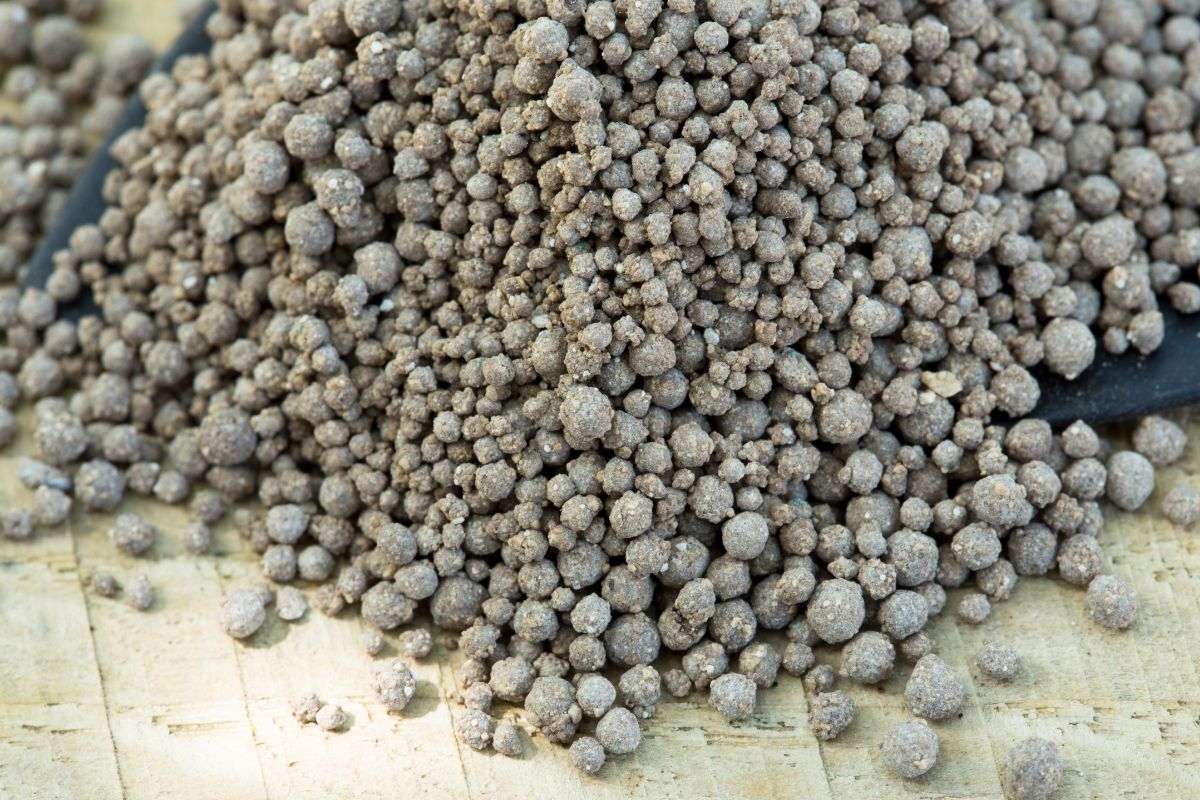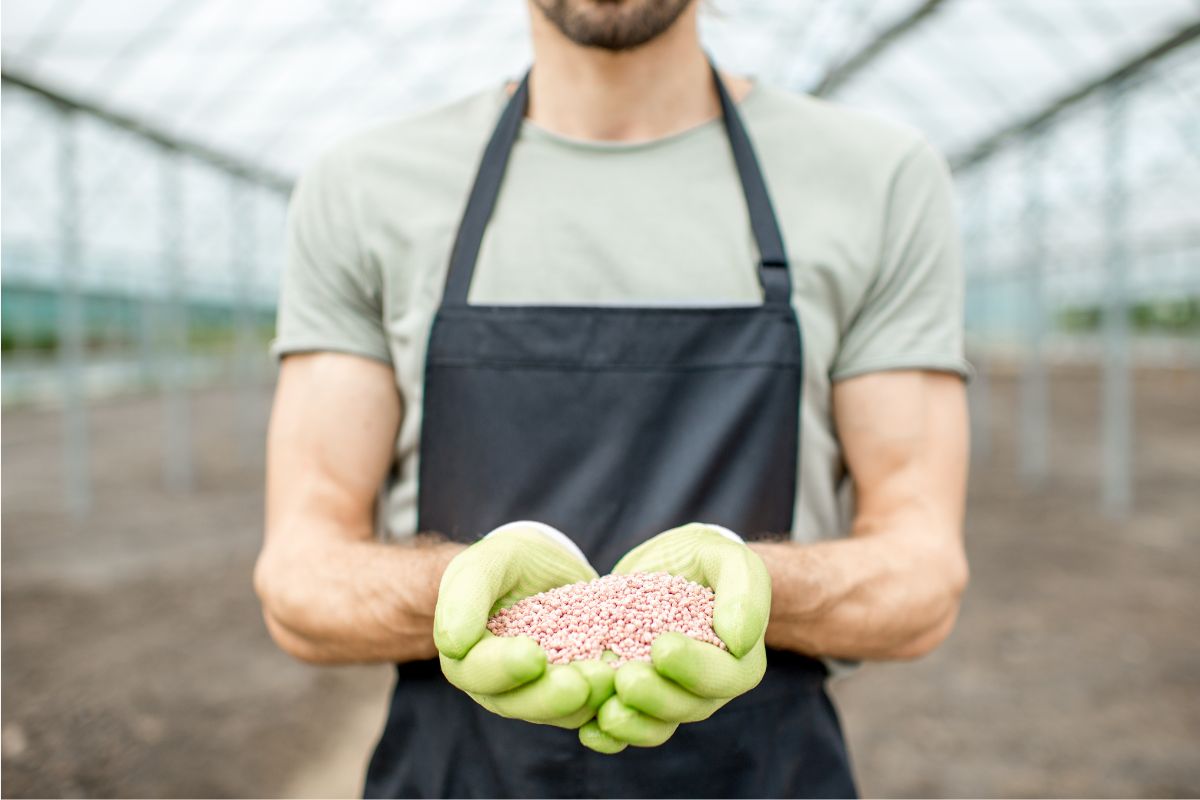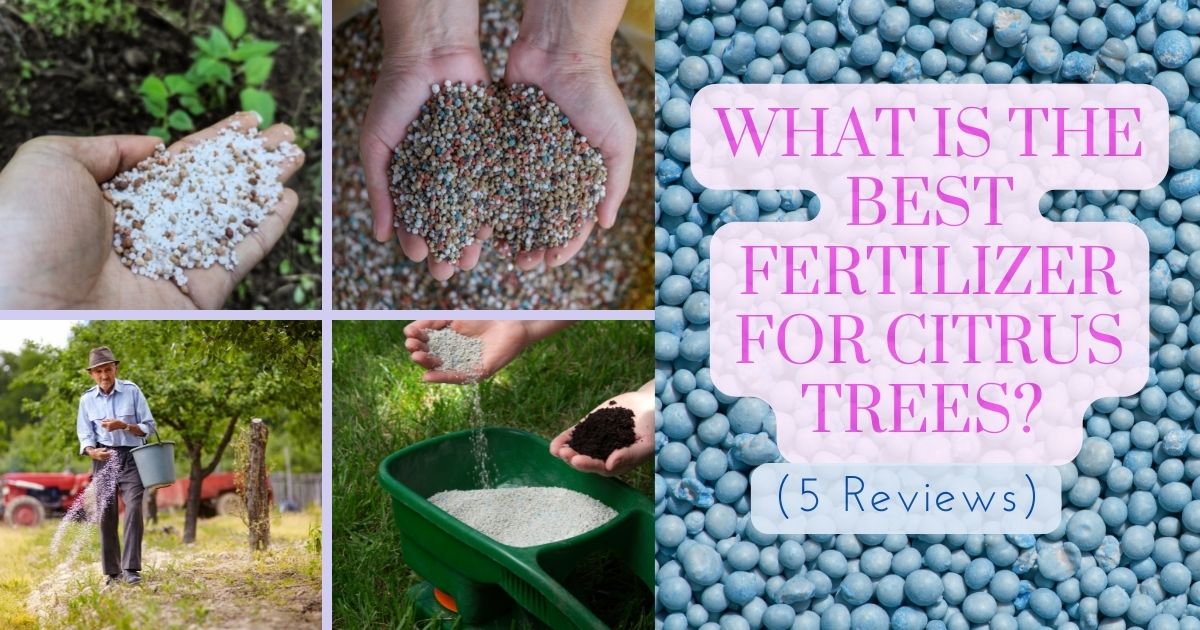Citrus Fertilizer
Like any other plant, citrus trees need fertilizer to thrive well. But what is the best fertilizer for citrus trees? The best fertilizer for citrus trees should contain all the nutrients. These nutrients will help develop healthy branches, leaves, and even roots.
There are different types of citrus fertilizers. All of them work to produce healthier citrus trees. However, the best one should cater to your plant’s needs. Read our article and find out 8 Best Fertilizer for Fiddle Leaf Figs.

When to Fertilize Citrus Trees
Fertilizing a citrus tree is the best thing you can ever do to help the fruits thrive and produce healthy fruits. However, you cannot fertilize this tree at any time. Instead, there’s a specific time to do it. So, when to fertilize citrus trees? It all depends if you are planting indoors or outdoors.
Planting Indoors
Typically, growing citrus indoors is not an easy task. It requires a bit of care, but it is worth it. Only fertilize citrus trees during the growing season, from late March to early august. Use liquid fertilizers such as kelp, seaweed, or organic granular fertilizer.
Do this every two to three weeks, but not in the Winter, since there’s new growth. Alternatively, use a small amount of organic granular fertilizer in late March to encourage new growth.
Planting Outdoors
If you are planting your citrus trees outside, fertilize in early spring before the trees bloom. Generally, fertilize citrus trees every 1 to 2 months during the growing season. Then, increase the duration to every 2 to 3 months during fall and Winter.
Again, fertilize newly planted citrus trees only when they’re a year old. Also, fertilize older citrus trees once every three months. Don’t fertilize until the fruit is about the size of a pea, usually around mid-May.
Now that you know the right time to fertilize your plant, how to fertilize your citrus trees?
How to Fertilize Citrus Trees
Before fertilizing your citrus trees, you need to know that it doesn’t apply to new ones. Give them time, and feed them for at least one year. After that, you are free to fertilize your genius plants. Here’s how to.
- Before you apply the fertilizer, water the soil and the tree.
- Check the label and follow the directions.
- Ensure that you don’t apply all of it at once – divide by three the annual amount of fertilizer needed by your tree. This act is essential because smaller trees require less fertilizer than larger ones.
- Apply fertilizer around the tree’s perimeter, and rake into the top few inches of soil.
- Remember the direction on the label; apply the right amount because too much nitrogen in the fertilizer leads to peeling.
What are the Benefits of Fertilizing a Citrus Tree?
Many people believe in the notion of living citrus trees growing on their own. This is unacceptable because it requires a little boost, using the best citrus tree fertilizer. Fertilizing is the best thing that you can do for your citrus tree. Here are the reasons why.
Boost Yield
Fertilizing your citrus tree is essential because it will help boost yield. Many farmers and gardeners face the challenge of reduced yields because of not using fertilizer. Of course, you are applying the right growth requirements; water, best soil, and sunlight.
But what about fertilizer? Citrus fertilizer is crucial, especially if you are planting for commercial purposes. You will get lots of healthy bags and enjoy the profits.
Reduced Fruit Drop and Splitting
Walking on many citrus farms, you won’t miss one or two fruit drops and splitting. Typically, it is minimal. But too much of it means that something is wrong. When their fruit drop and split-ups, it might be because you are not feeding your trees with fertilizer. To avoid this, get the right fertilizer and grow healthy trees to produce healthy fruits.
Increased Fruit Size
The right citrus fertilizer should contain all the nutrients. Depending on the type of tree, be it lemon or orange, you need to select the right kind of fertilizer. This will make your tree healthy. Apart from that, it will increase the size of your fruits. And, of course, who doesn’t love big fruits? Big fruits attract buyers to your garden, and you might land huge tenders.

Our Top Citrus Fertilizer Product
Out of the five best fertilizers on our list, Miracle-Gro Shake N Feed Citrus, Avocado, and Mango Plant Food emerged as our top-rated citrus tree fertilizer. This is because it contains added potassium, magnesium, sulfur, and iron to help improve common nutrient deficiencies.
Furthermore, you can use it on new or existing in-ground citrus, avocado, and mango trees. Lastly, it does not burn the tree when used accordingly.
The Best Fertilizers for Citrus Trees at a Glance
- Miracle-Gro Shake’ N Feed Citrus, Avocado, Mango Plant Food – Best overall
- Down To Earth Organic Citrus Fertilizer – Best organic fertilizer
- Espoma Organic Citrus-tone 5-2-6 Natural & Organic Fertilizer and Plant Food for all Citrus, Fruit, Nut & Avocado – Best natural fertilizer
- Jobe’s, Fertilizer Spikes, Fruit, and Citrus – Best value
- Miracle-Gro Fertilizer Spikes for Fruit and Citrus Trees – Best for topping
Your Citrus Fertilizer Shopping Guide
Before purchasing your citrus fertilizer, you need to consider some vital aspects. Among them are form, desired effect, and chemical fertilizer content. Considering these factors will land you the best fertilizer for the citrus tree.
Organic vs. Inorganic
The first aspect to consider is checking the fertilizer type. For example, lemon tree fertilizer can either be organic or inorganic. Organic fertilizer comes from organic sources, such as organic compost, cattle manures, poultry droppings, or domestic sewage.
On the other hand, inorganic fertilizers are fully artificial and manufactured in exact doses. You can find their nutrient content on the bag. You can also find the one that meets specific needs.
Chemical Fertilizer Content
Apart from organic and inorganic fertilizer, check on the chemical fertilizer content. Chemical fertilizer is the number of synthetic compound substances formulated to increase crop yield. Chemical fertilizers show quick results and are easy to apply.
Too much of it can burn the plant and cause death. So, you need to check the exact content. For more details, check the back of the package or bag.
Form
Another important thing to consider is form. Different citrus tree fertilizers come in different forms. This type of fertilizer comes in three primary forms: liquid, granular, and spike. Each Form has advantages and disadvantages. Let’s take a look at each.
Liquid
These are solutions that boost the plant’s growth rate. They can either be a ready-to-use solution or a concentrated solution. For liquid citrus fertilizer to work, you should dilute it in water. Roots quickly absorb liquid fertilizers, and you can spray them on leaves.
Granular
This fertilizer looks like pellets or grains when you sprinkle it on the soil. They will dissolve slowly and offer trees a long-term supply of nutrients that can last an entire growing season or longer.
Spikes
Spikes gradually dissolve in the soil, offering long-term feeding. Spikes are more costly than liquid and granular fertilizers, thus suited to those with just a few trees or potted trees.
Growing Stages
To apply fertilizer, you need to check up on the growing stage. Citrus trees require fertilizer. Based on their age and soil nutrient content. Therefore, it is wise to test the soil with a qualified fruit tree specialist to determine exact nutrient needs.
Generally, use just one-third of the recommended fertilizer on the package for each feeding. For lemons and limes, conduct the third feeding until August or September. Don’t fertilize newly planted citrus trees until they’re two years old. Then, just water regularly to ensure they become established.
Desired Effect
Lastly, check on the desired effect. For better root development and healthy foliage, citrus trees require fertilizer to help them bloom. A fertilizer that’s high in phosphorus enhances bloom production. Test the soil, and then select a fertilizer with an NPK analysis that suits the individual tree’s nutritional needs. This will help maintain the overall health of the citrus tree.
Reviewing the Best Citrus Tree Fertilizer on the Market
The best citrus fertilizer should contain high-quality ingredients. However, fertilizers come in different features, and in most cases, they vary in aspects such as NPK analysis. The best citrus tree fertilizer contains nutrients needed to correct soil deficiencies and create an optimal environment for the tree to thrive—the following types of fertilizer display such features.
Miracle-Gro Shake’ N Feed Citrus, Avocado, Mango Plant Food – Best Overall
General Description
Miracle-Gro Shake N Feed Citrus, Avocado, Mango Plant Food is the best citrus fertilizer. It contains potassium, magnesium, sulfur, and iron to help improve common nutrient deficiencies. It is suitable for new or existing in-ground citrus, avocado, and mango trees.
For better results, feed your tree for up to 3 months. While many farmers are concerned about the effects of certain fertilizers on a citrus tree, this one is a plus since it won’t burn the tree. For In-ground gardening, shake evenly onto the soil within the spread of the branches (drip line).
While doing this, avoid contact with the trunk or foliage. For individual plants, sprinkle the fertilizer, work into the topsoil, then water to start feeding. For container gardening, mix into the soil at the time of planting. For established plants, shake evenly onto the soil and lightly work in. Water to start feeding. Apply dry, do not pre-mix with water.
Pros
- It is safe
- Easy to apply
- Improves nutrients
Cons
- Quite expensive
N-P-K ratio: 8-2-10
Brand: Miracle-Gro
Item form: Granules
Item weight: 4.5 pounds (2 kilograms)
Specific use: Improving nutrients
Down To Earth Organic Citrus Fertilizer – Best Organic Fertilizer
General Description
Down To Earth Citrus is a box of all-natural fertilizer with a 6-3-3 formula listed by the Organic Materials Review Institute (OMRI) for use in organic production. It has primary and secondary plant nutrients like calcium, sulfur, zinc, and iron.
It supplies the proper ratio of nitrogen, phosphorus, and potassium that helps promote lush new growth, abundant green foliage, fragrant blossoms, and bountiful fruit. This fertilizer is an excellent option for citrus trees of all kinds.
You can use it to feed other fruit trees, vines, and ornamentals for equally enjoyable results. It contains a feather meal, alfalfa meal, green sand basalt zinc sulfate, and kelp meal.
Pros
- Multipurpose, can be used to feed other trees
- Proper supply of nutrients
- Lacks chemicals
Cons
- Granules require raking before watering.
N-P-K ratio: 6-3-3
Brand: Down To Earth All Natural Fertilizers
Item form: Granules
Item weight: 25 pounds (11.3 kilograms)
Specific use: Potting
Espoma Organic Citrus-tone 5-2-6 Natural & Organic Fertilizer – Best Natural Fertilizer
General Description
If you are looking for citrus fertilizer suitable for all trees, opt for Citrus-Tone organic fertilizer. You can use it in lemon, lime, orange, avocado, and nut trees. This orange tree fertilizer contains a citrus tone and a rich blend of the finest natural & organic ingredients. In addition, you don’t have to worry about its safety since it is environmentally friendly.
For better results, use citrus-tone fertilizer in late winter pre-bloom, spring post-bloom, and fall. Apply to the soil around the tree’s drip line and water thoroughly. The better part is that it is ready to use and requires no mixing. Nonetheless, use it in organic gardening since it meets all requirements for organic production.
N-P-K ratio: 5-2-6
Brand: Espoma
Item form: Granules
Item weight: 8 pounds (3.6 kilograms)
Specific use: Gardening
Pros
- Has the finest natural ingredients
- Meets all the requirements
Cons
- The user must rake granules into soil and water as directed.
Jobe’s, Fertilizer Spikes, Fruit, and Citrus – Best Value
General Description
Using liquid fertilizer can be a nightmare, especially on potted trees. This is because the fertilizer can wash out the drain holes and water. However, Jobe’s Fertilizer Spikes ensure a consistent fertilizer supply since spikes dissolve slowly.
It contains natural ingredients, bone meal, feather meal, and microbiomes that encourage soil health and increased fruit production. The 6-pack reusable pouch is ideal for citrus trees and fruits.
For better results, insert new spikes every four to six weeks for a continuous supply of citrus-loving nutrients.
Pros
- Easy to use and mess-free
- Continuous supply of nutrients
Cons
- Spikes can attract dogs.
N-P-K ratio: 4-6-6
Brand: Jobe’s
Item form: Spikes
Item weight: 0.7 pounds (0.3 kilogram)
Specific use: Potting
Miracle-Gro Fertilizer Spikes for Fruit and Citrus Trees – Best for Topping
General Description
Miracle-Gro’ Fertilizer Spikes for Fruit and Citrus Trees provide trees with the nutrients they need for healthy roots and increased fruit production. You need to top the spikes with the plastic caps in the package and use a hammer to drive the spikes into the ground at the tree’s drip line.
The spikes contain natural ingredients such as feather meal, bone meal, and magnetic rock. Hammer the spikes in, then spend time tending to other garden and orchard tasks. This promotes lush foliage and enhanced fruit production.
It is best to use it once in spring and again in fall. The easy-to-use spikes release nutrients into the root zone to help promote strong fruit and citrus trees.
Pros
- Easy to use
- Contains some natural ingredients
- Release nutrients directly into the soil
Cons
- Spikes can break up if you apply a lot of energy while hammering.
N-P-K ratio: 10-15-15
Quantity: 21 liters
Brand: Miracle-Gro
Item form: spikes
Item weight: 3 pounds
Specific use: Fruiting
Common Pests and Diseases Affecting Citrus Trees
There’s much to love about citrus fruits, including the pleasant taste. And up to now, it’s clear that you have the right fertilizer for your citrus trees. But when pests and diseases show up, things might go south. The trees might suffer and even die. However, you can get them back on track. So, here are the common pests and diseases and the best treatment method.
Aphids
Citrus aphids usually suck the sap and can cause massive distortion if not controlled. Besides destroying fresh leaves and stems, they secrete honeydew, which attracts ants and may cause sooty mold. To prevent this issue, spray populations with Defender Pyrethrum.
Fruit Fly
Like aphids, citrus fruity is increasingly becoming popular. Since they like warmer humid areas, they will lay eggs in fruits as they ripen. So it is vital to collect and dispose of citrus fruit, including those that have fallen to the ground. To control them, yellow sticky traps and liquid lure traps entice fruit flies.
Citrus Gall Wasp
When you find eggs under the bark on the soft, new shoots of most types of citrus trees, be sure that it is a citrus gall wasp. The woody galls form around the larvae when they hatch from the eggs. The larvae develop within the galls, and the adults emerge through small holes in spring to go on to infect more shoots.
Therefore, galls in Winter encourage new growth in early to mid-Spring, just as adult wasps are looking for soft shoots to lay their eggs. To treat this disease, use a sharp knife or potato peeler to slice through as many galls as possible, and kill the larvae. Then, dispose of all material by wrapping in plastic and placing it in the garbage bin.
Sooty Mold
This mold grows on the sticky honeydew secretions of insects such as aphids. The good news is that the pests and the mold will disappear without treatment.
Crown Rot
This disease occurs around the graft union of the plant, a point of weakness where fungal infections can occur. Treat it with a fungicidal poultice.
Scale
Scales are generally found on the undersides of leaves and soft growth. You see a shell-like covering (the scale) over a small, sap-sucking insect. Sapsuckers in large populations can cause massive destruction. Just remove it with a thumbnail, but the best control is with a horticultural, pest, or eco oil to smoothen the pest.
Leafminer
Closing the list is citrus leafminer. It tunnels through leaves under the outer skin, causing distorted and curly leaves. The pest, present from around the end of December through to April, is a small nocturnal moth that lays eggs on the undersides of soft new leaves.
These hatch into tiny grubs that burrow into and then move through the leaves. Apply horticultural pest or eco oil every three weeks to control the pest.
FAQs on Citrus Tree Fertilizers
Citrus fruits are the topic of the day during summer. Of course, you won’t miss seeing these fruits in one or two gardens in your neighborhood. But they come with eternal questions. So if you are a citrus fruit enthusiast looking for answers, here are some frequently asked questions about citrus tree fertilizers.
Q: Do citrus trees need special fertilizer?
A: Generally, citrus trees don’t require a special type of fertilizer. They can thrive in good conditions. However, most of them thrive well with an all-purpose citrus fertilizer. Additionally, the fertilizer needs to contain more nutrients; in some cases, you might find that it needs more than one. To be safer, conduct a soil test and get a fertilizer with the required nutrients.
Q: What are the different types of citrus tree fertilizers?
A: Citrus fertilizers come in different types. Some are in the form of spikes, liquids, or granules. For instance, you can find a citrus organic fertilizer that comes in the form of liquid.
Q: Are coffee grounds good for citrus trees?
A: Coffee grounds are good for citrus trees since they provide essential nutrients. They also thrive in soil with a pH of 5 to 6. So, coffee grounds will help keep the soil’s pH balanced.
Q: Can you over-fertilize citrus trees?
A: You don’t need to over-fertilize your citrus tree. For instance, if you are using fertilizer for lime trees, following the guideline on the package label and maintaining regular routines is enough. Overfertilizing a healthy tree is dangerous because it can cause inferior fruit. Also, expressing too much kindness when fertilizing can cause huge losses. Just apply the right amount and watch over your tree.
How We Selected Our Picks
Citrus fertilizers are the best since they cater to the needs of citrus trees. When selecting the best picks, we checked on aspects such as nutrient content, type of soil, whether formulations were organic, and the form of the fertilizer.
The fertilizers outlined above are the best compared to other citrus fertilizers on the market. They contain all the nutrients to boost your plan’s growth. They also come in different forms, such as liquid and granules.
As a gardener, familiarize yourself with your region’s soil types to get the best fertilizer and enhance healthy growth.
Why Trust Our Gardening Info
We have been in the market for quite some time. From this, we have gained a lot of experience in different gardening activities. We also have a team of experts with all the knowledge required to bring out useful information. For example, the team tested different fertilizers using the best gardening tools to help narrow your search.

A Final Word
Indeed, fertilization is vital in citrus trees. It aids in producing large fruits and maintaining the overall health of your tree. But, as much as fertilizing your citrus tree is not an easy task, what is the best fertilizer for citrus trees?
The right citrus fertilizer should support healthy roots for better flowering and fruiting. Our best overall is Miracle-Gro Shake’ N Feed Citrus, Avocado, Mango Plant Food. It is easy to use and contains all the nutrients for a healthy tree. You can also get the best one from our list above.




